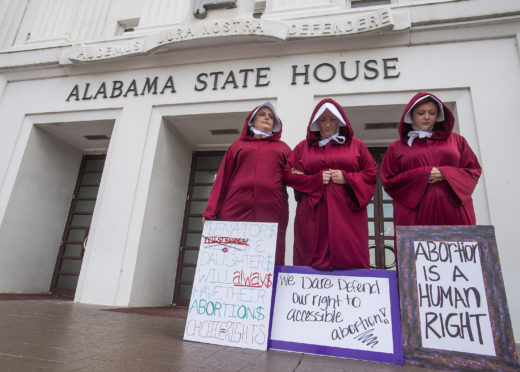Abortion.
I’ll just let the word hang in the air for a moment. It’s one of those topics, like miscarriage, which somehow still remains taboo.
We hardly talk about it – even in this day and age when most of us are willing to bare our souls on just about any subject.
Yet the statistics show we all probably know someone who has had one.
About a third of women in the UK will have an abortion by the time they are 45, according to sexual health and wellbeing charity Brook.
In America, the figure is one in four by the same age.
And UK Government figures, published last year, reveal almost 17 in 1,000 resident women had an abortion in 2017.
The issue was hurled ferociously back into the spotlight this week when Alabama’s Republican-controlled state senate passed a near blanket ban.
Approved by 25 male senators, the Human Life Protection Act makes it a crime to perform an abortion at any stage of pregnancy, punishable by up to 99 years in prison.
There is no exception for rape or incest – only when the procedure is necessary to prevent a “serious health risk” to the woman, for ectopic pregnancy and in the event of a “lethal” foetal anomaly.
Signing it into law, Alabama Governor Kay Ivey said in a statement it was a “powerful testament to Alabamians’ deeply held belief that every life is precious and that every life is a sacred gift from God”.
A day later, she oversaw the execution of convicted murderer Michael Samra, the seventh person to be put to death since the start of her tenure in April 2017.
It seems that not every life is so precious after all.
In the wake of the Alabama legislation, Missouri’s state legislature followed suit with a bill that would outlaw nearly all abortions at eight weeks, before which point a woman might not be aware of her pregnancy.
They are the latest in a slew of bans across the US, which their sponsors hope will be challenged, as a means of forcing the Supreme Court to reconsider the landmark 1973 Roe v Wade ruling, which legalised abortion.
Following the nominations of Brett Kavanaugh and Neil Gorsuch by President Donald Trump, the court now has a conservative majority.
Of course, it is impossible to write about changing US abortion laws without also looking at the situation much closer to home, in Northern Ireland, where – unbelievably – the law is even stricter.
In England, Scotland and Wales, in line with the 1967 Abortion Act, a woman can legally have an abortion up to 24 weeks into pregnancy.
This was never applied in Northern Ireland, however, where the procedure remains illegal except in a handful of instances such as when there is risk of loss of life from physical illness or suicide.
Under laws dating back to 1861, the maximum sentence is life imprisonment, and crucially – unlike Alabama – the woman, as well as medical staff, can be prosecuted.
I’m usually really good at seeing both or more sides of an argument, but I simply can’t get my head around this.
The idea a woman could be forced to give birth to her rapist’s child is frankly disgusting.
Let’s say that first and foremost. How anyone can begin to try to justify that is beyond me.
This shouldn’t only be about the extreme examples, however.
There are a host of reasons why a woman might want or need to terminate her pregnancy. And, regardless of what these are, she should have the right to make this decision.
Because it’s her body.
As the pro-choice protesters outside the Alabama senate put it: “Get out of my uterus.”
Moreover, if the goal of abortion opponents is to bring the practice to an end, banning it certainly isn’t the way to achieve this because it doesn’t mean women don’t have them. Rather, as we’ve seen in the past in the Republic of Ireland – which last year voted overwhelmingly to overturn the country’s abortion ban – it merely creates a two-tiered system.
Women who can afford it travel to areas with fewer restrictions, while those who can’t are more likely to resort to dangerous methods.
With such entrenched attitudes on both fronts, people are unlikely to ever be in agreement about what is right or wrong. Or indeed on the question of when abortion – if they aren’t against it altogether – should cease to be an option.
At the end of the day, people have different views – that’s life. The point is we shouldn’t be imposing these on each other. So, in the same way no woman should be forced to have an abortion, no woman should be forced not to either.
I’ve never had one and don’t know how l would feel were I to be faced with the decision, other than to say that – as I expect like most others – I wouldn’t come to it lightly.
But what I am sure about, 100% certain of, is that I would want to have a choice, for the situation to be within my control.
As the lawyer Sarah Weddington, best known for representing ‘Jane Roe’, wrote in her book A Question of Choice: “It is unthinkable to allow complete strangers, whether individually or collectively as state legislators or others in government, to make such personal decisions for someone else.”
Lindsay Razaq is a journalist and former P&J Westminster political correspondent who now combines freelance writing with being a first-time mum

